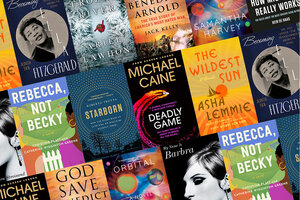Barbra, Ella, and Benedict Arnold entertain in December’s 10 best books
Our picks for the month include a Barbra Streisand memoir, a biography of Ella Fitzgerald, and a reexamination of Revolutionary War hero-turned-traitor Benedict Arnold.

1 The Frozen River, by Ariel Lawhon
During the punishing Maine winter of 1789, midwife Martha Ballard hunts for the truth about a frozen body pulled from the river. Drawing on her knowledge, connections, and unflinching sense of right, Martha sacrifices her reputation – and safety – to find answers. Lawhon’s smart, deeply felt story enthralls; it underscores the remarkable courage needed to buck conventions.
2 Orbital, by Samantha Harvey
In a space station high above Earth, an international crew of six astronauts circles the planet – 16 times in a 24-hour span – ticking off tasks, eating meals from pouches, and hanging “like bats in their quarters.” Samantha Harvey’s hushed, perfect novel, her fifth, transports. “The earth feels – not small,” muses the narrator, “but almost endlessly connected, an epic poem of flowing verses.”
3 Rebecca, not Becky, by Christine Platt and Catherine Wigginton Greene
De’Andrea Whitman, a successful Black Atlanta lawyer who turned stay-at-home-mom, moves with her family to Georgia’s white upper-class Rolling Hills Estates. She meets fellow mom and president of the diversity club Rebecca Myland, who eagerly attempts to advance racial awareness in the community. Hilarious, empathetic, and smart, this social satire transforms into a highly relevant examination of racial justice.
4 Deadly Game, by Michael Caine
After a briefcase of weapons-grade uranium appears at the Stepney tip – aka the dump – only to be immediately stolen, Detective Chief Inspector Harry Taylor and his special ops team at New Scotland Yard race to find the goods. British actor Michael Caine packs this lively procedural – his foray into fiction – with over-the-top drug lords, risky face-offs, spectacular explosions, and the resolute loyalty such work demands.
5 The Wildest Sun, by Asha Lemmie
Aspiring writer Delphine Auber runs away from her orphanage in 1945 Paris to seek out her true destiny and meet her presumed Papa, famed author Ernest Hemingway. Beautifully written, Asha Lemmie’s emotional and ultimately triumphant coming-of-age novel is told in Delphine’s evolving voice as she journeys to Harlem, Havana, and Key West, discovering who she is meant to be.
6 Becoming Ella Fitzgerald, by Judith Tick
By accessing long-neglected archives and interviewing those who knew her, Judith Tick provides a rich portrait of jazz and blues legend Ella Fitzgerald. The singer not only altered the role of women in the music industry, but also helped define the American songbook.
7 My Name Is Barbra, by Barbra Streisand
Barbra Streisand’s exhaustive, exuberant thousand-page memoir has it all. The singer, actor, and director details her difficult childhood and meteoric rise to fame; dishes on her friends, lovers, and collaborators; and argues that she was tarred as “difficult” because men in show business couldn’t accept a woman calling the shots.
8 God Save Benedict Arnold, by Jack Kelly
The name Benedict Arnold is synonymous with treason, but Jack Kelly reminds us that Arnold was a hero of the American Revolution before he defected to the British side. The historian’s vivid and fast-paced narrative presents Arnold in full, detailing his ambition, his bravery, and, finally, his treachery.
9 How Migration Really Works, by Hein de Haas
Sociologist Hein de Haas analyzes 22 myths about migration from across the political spectrum. He shows that the arguments made by supporters as well as opponents of migration are almost always simplistic, incomplete, and, sometimes, just plain wrong. De Haas offers a rare and welcome voice of evidence-based clarity on one of the world’s hottest and most complex political issues.
10 Starborn, by Roberto Trotta
In this gracefully written history of stargazing, cosmologist Roberto Trotta makes a strong and intriguing case that astronomy has been the midwife to all other sciences.

